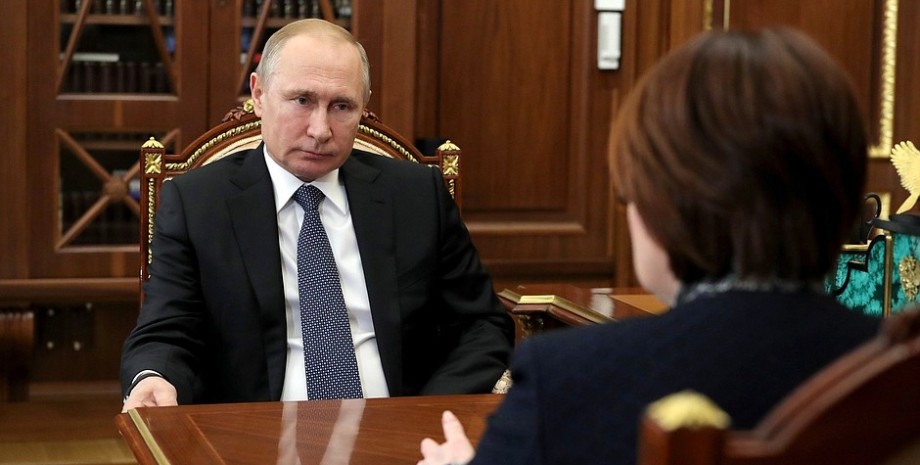
 By Victor Duda
By Victor Duda
Despite the numerous rounds of Western sanctions imposed after the invasion of Ukraine in 2022, the Russian economy, the movable export of oil, gas and minerals, has demonstrated sustainable growth over the past two years. However, due to lack of labor and high interest rates, introduced to combat inflation, which has accelerated against the background of record military expenses, in recent months, internal activity has become tense.
According to two sources familiar with the Kremlin's position, this contributed to the formation of thought among the Russian elite about the desirability of the settlement of war through negotiations. Donald Trump, who returned to the post of president, promised to quickly resolve the largest in Europe since the Second World War "Conflict".
He stated that additional sanctions are likely to be alleged in Russia, as well as duties, if Putin did not go to negotiations, adding that the Russian Federation is moving to "big problems" in the economy. A high -ranking Kremlin assistant stated that Russia has not yet received any specific negotiation proposals.
"Russia is, of course, economically interested in the negotiations on diplomatic termination of the conflict," - said former deputy chairman of the Central Bank of Russia Oleg Vygin, pointing to the risk of increasing economic distortions, as the country sharply increases military expenditures.
Earlier, Reuters wrote that Putin is ready to discuss with Trump options for ceasefire, while the parties should accept territorial "heritage" of Russia, and Ukraine should give up plans to become a member of NATO. Trump advisers, as the agency notes, "forgot" about the election statement that a war that has been going on for almost three years can be stopped in one day.
The representative of the White House National Security Council, Brian Guz, commented that Trump was "focused on the cessation of this cruel war", attracting a wide range of stakeholders. A few days before Trump's inauguration, US Presidential Administration Joe Baiden introduced the widest package of sanctions against Russia's income from oil and gas.
Baiden's National Security Advisor Jake Sullivan noted that this will give Trump a lever of influence in any negotiations, making economic pressure on Russia. Putin stated that Russia would be able to fight as much as it would be needed, and that Moscow would never bow to another state in the question of key national interests. The Russian economy with a volume of $ 2.
2 trillion showed amazing endurance during the war, and the Kremlin's head praised leading economic officials and business for having bypassed the harshest Western sanctions ever imposed against a large economy. After the Reduction of Russia in 2022, Russia increased faster than in the European Union and the United States in 2023 and 2024. However, this year, the Central Bank and the International Monetary Fund are predicting an increase in less than 1.
5%, although the government is predicting somewhat more rainbow prospects. Inflation approached ambiguous figures, despite the fact that in October, the central bank increased the base interest rate to 21%. "There are some problems here, namely inflation, a certain overheating of the economy. The government and the central bank have already been tasked with rapid," Putin said at the annual press conference on December 19.
In 2024, Russia has achieved considerable success compared to the first days of hostilities, and now controls almost a fifth of Ukraine. According to a source acquaintance with the Kremlin's position, Putin believes that the main goals of the war have already been achieved, including the control of the territories that connect the mainland of Russia with the Crimea and the weakening of the Ukrainian army.
The Russian president is also aware of the source of the war on the economy, mentioning "really big problems", such as the impact of high interest rates on enterprises far from the military industry. Russia has increased defense costs to the post -Soviet maximum by 6. 3% of GDP, which is one third of the budget expenditures. And since the costs were inflation, along with the lack of labor, it has led to a wage increase.
According to two sources aware of discussions about the Kremlin and the Government, at a meeting with business executives last December, the disappointment of Putin was quite expressive. He read higher economic officials, hearing about reducing private investments due to the cost of loans. At the same time, at the meeting, the head of the Central Bank Elvira Nabiullin was not present.
Some of the most influential businessmen of Russia, including Rosneft's head Igor Sechin, Rostech's chairman Sergiy Chemezov, aluminum magnate Oleg Deripaska and the largest shareholder of the Stairsist Staffy Starodashov, was publicly opened. Putin himself called for a "balanced rate" and the central bank retained the rate of 21%, despite the expectations of the market that it would increase by 200 base points.
As one of the sources reported, Nabiullin was faced with pressure that he demanded not to raise the rates, from the two most influential bankers of Russia - the head of Savings Bank Herman Gref and the head of VTB Andriy Kostin, who feared that Russia was moving to stagflation. In her speech, after the decision, Nabiullin denied the pressure. She said that the criticism of the central bank's policy increased when the rates were high.
Putin Elvira Nabiullin's former economic assistant has been holding the post of Central Bank chairman since June 2013. Without her, her supporters, the economic stability of Russia during the war, would be at risk. In addition, according to three sources at once, Putin trusts the head of the Central Bank and in such a situation will not change it.










All rights reserved IN-Ukraine.info - 2022